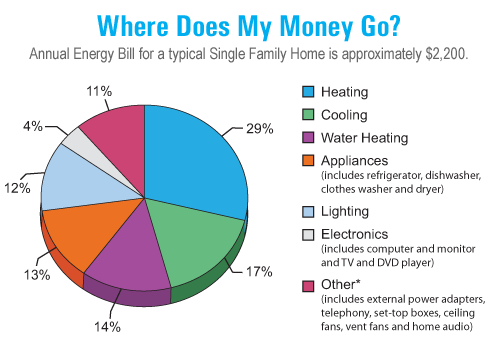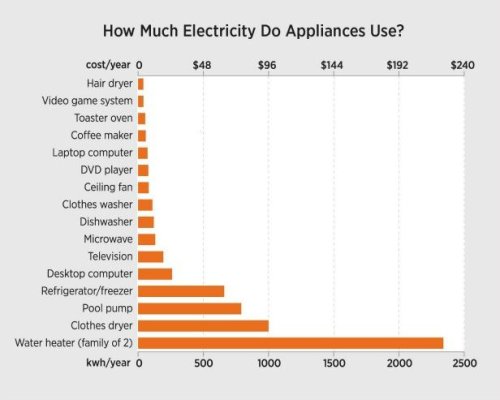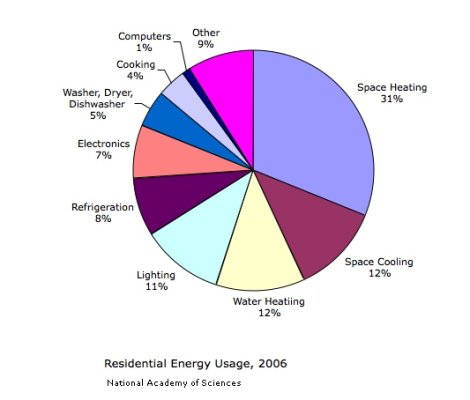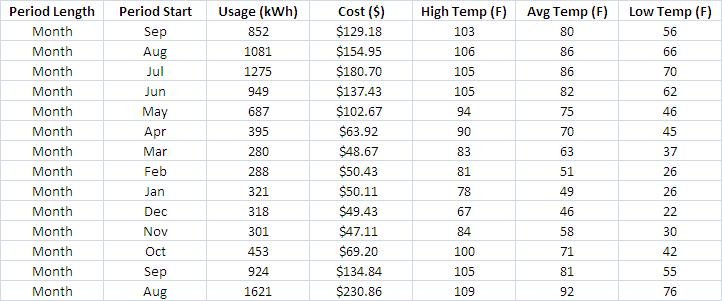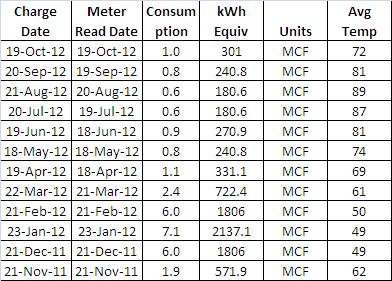You are using an out of date browser. It may not display this or other websites correctly.
You should upgrade or use an alternative browser.
You should upgrade or use an alternative browser.
PSA: Home Energy Costs? Where does the money go...
- Thread starter Midpack
- Start date
NW-Bound
Give me a museum and I'll fill it. (Picasso) Give me a forum ...
- Joined
- Jul 3, 2008
- Messages
- 35,712
Take away most of the heating and put it on cooling. That's me in the desert home.
In my boonies home, no cooling but also little heating: thermostat set at 45F.
Like the preacher in the lyrics of "California Dreaming", I like the cold.
In my boonies home, no cooling but also little heating: thermostat set at 45F.
Like the preacher in the lyrics of "California Dreaming", I like the cold.
Last edited:
travelover
Give me a museum and I'll fill it. (Picasso) Give me a forum ...
- Joined
- Mar 31, 2007
- Messages
- 14,328
.......... I didn't realize water heaters used so much...
Electric water heaters are real energy hogs. I have a natural gas water heater and it runs on about $1 day.
meierlde
Thinks s/he gets paid by the post
Note that now days if you get a new water heater installed it will be set at 120 and the installer can not up the temp, although they can tell you how. (This is to prevent burns, with modern dishwashers the dishwasher can heat the water to the needed temp).
Of course the big thing that helped me was replacing the heat pumps with new units both inside and out. Got up to an Ser of 15 with middle of the line componets. Note that if you have to replace an old AC now days likely you will have to buy a new inside coil as the refrigerant has changed.
Of course the big thing that helped me was replacing the heat pumps with new units both inside and out. Got up to an Ser of 15 with middle of the line componets. Note that if you have to replace an old AC now days likely you will have to buy a new inside coil as the refrigerant has changed.
- Joined
- Jul 18, 2010
- Messages
- 7,951
Wow, had no idea that water heaters were that bad. Our current house has 2 of them as well - not sure why as our previous home was 1,000 sq.ft. larger and had an additional full bath and it only had 1. Realtor speculated that it was due to the layout, that running HW through the attic for that distance would cause a lot of wasted H2O waiting for the water to get hot for each use. But keeping water hot in 2 tanks wastes a lot of electricity - especially with only two people living here. Not sure what might make sense to do to change it, thought.
Makes me glad we switched from electric tank water heater to gas on-demand hot water.
It was a total win-win... the old tank was in a stupid place (garage - far from bathrooms and kitchen), and ran the uninsulated pipe through the cement slab!!!! Now it's right off the kitchen, and we re-plumbed the lines much less circuitously. Get hot water in the shower in less than a minute - it used to take more than 5... That's a lot of water wasted.
It was a total win-win... the old tank was in a stupid place (garage - far from bathrooms and kitchen), and ran the uninsulated pipe through the cement slab!!!! Now it's right off the kitchen, and we re-plumbed the lines much less circuitously. Get hot water in the shower in less than a minute - it used to take more than 5... That's a lot of water wasted.
freebird5825
Give me a museum and I'll fill it. (Picasso) Give me a forum ...
Although I live out east of the middle of nowhere, I actually have natural gas service. Heat and hot water demands go through the same gas boiler. Piece of cake!Electric water heaters are real energy hogs. I have a natural gas water heater and it runs on about $1 day.
I've never calculated my rate. It might depress me.
ERD50
Give me a museum and I'll fill it. (Picasso) Give me a forum ...
But keeping water hot in 2 tanks wastes a lot of electricity ...
Not really. Electric water heaters are well insulated, so there isn't much loss. The majority of the energy goes to heating the water in the first place.
A gas water heater has a flue, and heat is lost through that. But EWH is sealed.
-ERD50
Grainiac
Recycles dryer sheets
- Joined
- Aug 12, 2010
- Messages
- 102
My power co offers a special rate 5.2 cents per kWh for water heater that operates during night hours only. Mine is a 18 years old 60 gal tank, which is more than enough for our two person family's needs. I know exactly what we pay for heating water since it has a dedicated power meter. The cost per month averages $11 and individual months have ranged from $9 to $13 for the past five years. I have natural gas in my house, but with this arrangement electric is my cheapest option for heating water.
pb4uski
Give me a museum and I'll fill it. (Picasso) Give me a forum ...
We have a Takagi on-demand propane hot water heater that not only provides our domestic hot water but also provides our central heat to the radiant slab in the walkout basement and hot water baseboard on the main floor. It's mounted on the wall so it takes up no floor space and is a little bigger than a 30-pack of beer. We've been real happy with it.
meierlde
Thinks s/he gets paid by the post
Wow, had no idea that water heaters were that bad. Our current house has 2 of them as well - not sure why as our previous home was 1,000 sq.ft. larger and had an additional full bath and it only had 1. Realtor speculated that it was due to the layout, that running HW through the attic for that distance would cause a lot of wasted H2O waiting for the water to get hot for each use. But keeping water hot in 2 tanks wastes a lot of electricity - especially with only two people living here. Not sure what might make sense to do to change it, thought.
Are they the same size or different sizes? Note that you can definitely run the one for the bathrooms at 120 F. At one time we tried an on demand electric hot water heater, but later I did some calculations and realized one would need a 1000 amp service to make it work correctly.
Mulligan
Give me a museum and I'll fill it. (Picasso) Give me a forum ...
- Joined
- May 3, 2009
- Messages
- 9,343
My natural gas water heater is almost free, or $30 a month depending on how you want to twist the numbers. I got natural gas installed to save on winter heat bills, and with little thought had the water heater also attached to the gas. Good thing I did as I did not know there is an approx. $30 min. fee whether I use any natural gas at all during that month.
And don't forget that if you've got an electric water heater inside the thermal envelope of your home, any heat it "loses" is actually helping to heat your home. That's handy in the winter months and not really a loss at all, though it's not welcome when the weather is warm.
We've got a "standard efficiency" NG water heater. It was the least expensive option for us over it's expected lifetime--better than tankless, better than a higher-efficiency "condensing" unit with a tank. And, much less stuff to break/fix.
We've got a "standard efficiency" NG water heater. It was the least expensive option for us over it's expected lifetime--better than tankless, better than a higher-efficiency "condensing" unit with a tank. And, much less stuff to break/fix.
FUEGO
Give me a museum and I'll fill it. (Picasso) Give me a forum ...
- Joined
- Nov 13, 2007
- Messages
- 7,746
Electric water heaters are real energy hogs. I have a natural gas water heater and it runs on about $1 day.
Mine's about $0.33 worth of gas per day, maybe double that in the winter (colder inlet water temp, DW taking longer hotter showers, and us raising the water heater thermostat to keep the hot water running hot longer for DW to take longer showers).
Our biggest energy expense in the SE US is by far cooling, followed closely by heating (nat gas). Heating and cooling are around 60% of our energy expense. $~1000 per year is spent on heating and cooling, around $60/month is what gas+electricity costs during months like October when we don't use the heat or a/c and just have all the other loads (elec dryer, fridge, dishwasher, water heater, appliances, tvs computers etc).
And of that $60/mo, $20 is a flat fee charged by the nat gas co and electric co ($10 each).
The good news is that our electric rates are going up 15% so that should mean it will now cost another $100 or so to cool the house to a chilly 76/73 day/night temp. I would gladly pay double for the comfort.
I didn't realize water heaters used so much...
Which emphasizes the importance of putting a jacket on those suckers -- gas, electric, wood, whatevuh... -- and where possible, insulating hot water pipes. Depending on size & usage, the jackets can payback the first year.
BTW -- got the source link for those charts?
Tyro
Last edited:
ERD50
Give me a museum and I'll fill it. (Picasso) Give me a forum ...
Which emphasizes the importance of putting a jacket on those suckers -- gas, electric, wood, whatevuh... -- and where possible, insulating hot water pipes. Depending on size & usage, the jackets can payback the first year.
BTW -- got the source link for those charts?
Tyro
I really question the blanket. They are already well insulated. When I looked at the small cost difference of a new one with 1" vs 2" of insulation, the payback probably exceeded the life of the water heater, based on the published energy usage ratings. And as samclem mentioned, any heat leaking into a heated space really isn't wasted anyhow.
Insulating the pipes could be worth it, as well as making sure there is a 'trap' so the heat isn't flowing along the pipes.
-ERD50
HFWR
Give me a museum and I'll fill it. (Picasso) Give me a forum ...
NG usage is less than 1MCF, except during the heating season, so water heat and cooking amount to less that 300kWh equivalent.
Highest usage in the past five years was 9.1 MCF, or 2731 kWh equivalent. I do not have a high-efficiency furnace, but only need that much heat in the worst month of the worst winter.
Electric usage is 300-500kWh about 2/3 of the year, then goes nuts during the a/c season. Highest this year was 1275 kWh.
Highest usage in the past five years was 9.1 MCF, or 2731 kWh equivalent. I do not have a high-efficiency furnace, but only need that much heat in the worst month of the worst winter.
Electric usage is 300-500kWh about 2/3 of the year, then goes nuts during the a/c season. Highest this year was 1275 kWh.
Attachments
Midpack
Give me a museum and I'll fill it. (Picasso) Give me a forum ...
Not sure what you're getting at, just Google and find all you want (and mouse over the OP charts if you want them specifically), but here you go... it took me 30 seconds to find them again.BTW -- got the source link for those charts?
http://www.energystar.gov/ia/products/globalwarming/images/pie_graph.png
http://revelle.net/lakeside/lakeside.new.photos/EnergyUsage.jpg
http://energy.gov/sites/prod/files/styles/article_hero/public/graph_appliance%20electricity.jpg
W2R
Moderator Emeritus
Last year my lowest monthly electric bill was only 12% of my highest, due to AC.
I have one of the newer, energy efficient AC systems and don't turn it down as far as most people do.
So anyway, I have a pretty good idea of where my electricity $$$ are going.
I have one of the newer, energy efficient AC systems and don't turn it down as far as most people do.
So anyway, I have a pretty good idea of where my electricity $$$ are going.
CCdaCE
Full time employment: Posting here.
- Joined
- Apr 3, 2006
- Messages
- 897
There must be a lot of variables in energy costs, location/weather, home layouts & SQ. FT., etc.
My biggest savings from moving was getting off of megacorps electricity and on to rural electric. Saves $15-$20 a month in service fees for moving across town. That and I changed 4 bulbs in each of the 6 ceiling fans from incandesent to CFL or LED, plus about 10 other bulbs. Breakeven in about 1-1.5 years depending on how many hours a day the bulbs are used. Went from electric to gas water heater. Previous house had CFLs. but, my first bill has dropped 50%, so the 40 years newer construction in the current house must be the difference. We'll see, this winter.
I'm guessing the hot water heaters between the previous house new and are set roughly the same. Haven't tried a thermometer, but the shower feels the same.
What impressed me was how much energy is saved by turning your water heater down to 125 or whatever number was used. One source said:
Another link: http://www.houselogic.com/home-advice/water-heaters/water-heaters-5-tips-for-saving-energy/
-CC
My biggest savings from moving was getting off of megacorps electricity and on to rural electric. Saves $15-$20 a month in service fees for moving across town. That and I changed 4 bulbs in each of the 6 ceiling fans from incandesent to CFL or LED, plus about 10 other bulbs. Breakeven in about 1-1.5 years depending on how many hours a day the bulbs are used. Went from electric to gas water heater. Previous house had CFLs. but, my first bill has dropped 50%, so the 40 years newer construction in the current house must be the difference. We'll see, this winter.
I'm guessing the hot water heaters between the previous house new and are set roughly the same. Haven't tried a thermometer, but the shower feels the same.
What impressed me was how much energy is saved by turning your water heater down to 125 or whatever number was used. One source said:
Lowering the temperature from 140 to 120 would reduce your water heating costs by 6 to 10%.
Another link: http://www.houselogic.com/home-advice/water-heaters/water-heaters-5-tips-for-saving-energy/
-CC
Last edited:
pb4uski
Give me a museum and I'll fill it. (Picasso) Give me a forum ...
Just curious - why insulate the inlet pipes? The outlet makes perfect sense to conserve the heat in the outlet hot water, but I don't get why to insulate the inlet pipes. In fact, given that the incoming water is cold I would have thought it would be better to not insulate those pipes and let the ambient air warm the water ever so slightly.
For the 98% of the time that water isn't moving, the heated water inside the tank heats up the water in the inlet pipes, and when that radiates through the pipe walls and escapes you are losing heat you've already paid for. Many/most new water heaters have small flapper valves that reduce this heat loss, but it still happens. By insulating the pipes (both incoming and outgoing) we can reduce heat loss.Just curious - why insulate the inlet pipes?
Letting the water get warm through the use of ambient heat in the house isn't a winner or a loser. If it picks up heat from the room air, it's ever-so-slightly cooling off the room air, which must be warmed again using your furnace.
From a practical standpoint, insulating these inlet pipes can prevent dripping/condensation when warm, moist air inside the house contacts the outside of a water pipe with cool water from the outside.
My power co offers a special rate 5.2 cents per kWh for water heater that operates during night hours only. Mine is a 18 years old 60 gal tank, which is more than enough for our two person family's needs. I know exactly what we pay for heating water since it has a dedicated power meter. The cost per month averages $11 and individual months have ranged from $9 to $13 for the past five years.
No $6/month fee for reading/maintaining the 2nd meter? You have a nice power company!
Ours is insulated to prevent condensation in our crawlspace. Also prevents freezing if we get a real cold snap in winter.Just curious - why insulate the inlet pipes? The outlet makes perfect sense to conserve the heat in the outlet hot water, but I don't get why to insulate the inlet pipes. In fact, given that the incoming water is cold I would have thought it would be better to not insulate those pipes and let the ambient air warm the water ever so slightly.
Similar threads
- Replies
- 15
- Views
- 482

